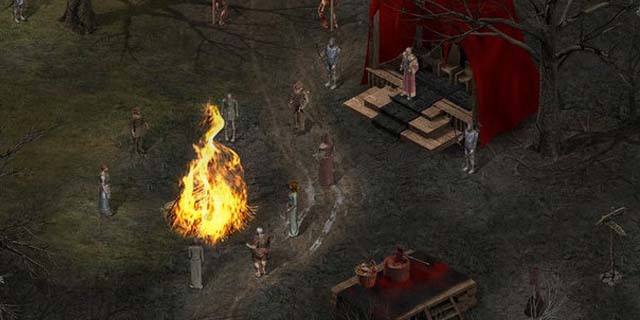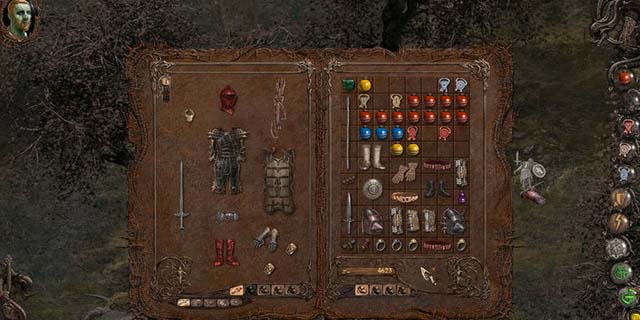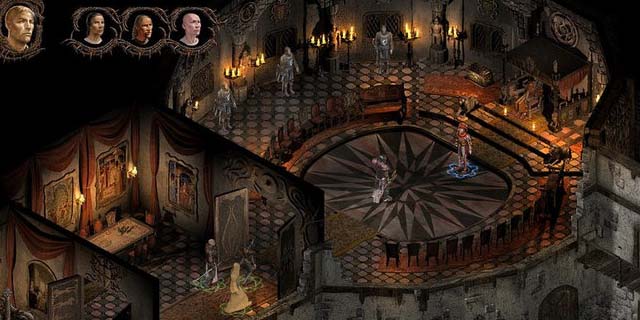
Over the past three years, the kingdom of Ultherst has been traumatized by three Scourges, a massive famine, a plague and a rain of fire. The population has been decimated, and those who’ve survived have begun turning from the Church to long-forgotten pagan beliefs and rituals for comfort. As a result, the Church has begun an Inquisition to root out heresy and bring people back to the faith. You have been charged to work with the Inquisition, investigating crimes and uncovering the truth.
Inquisitor is very much a throwback to the olden days of PC RPGs, and very obviously inspired by games like Baldur’s Gate. It foregoes all modern conventions, opting instead to go old-school in every manner possible.

You have three classes to choose from: Paladin, Priest and Thief. Each has a slightly different background affiliation, and thus can advance in different orders. The Paladin can move up the ranks of the Holy Order of Knights, the Priest can become the High Inquisitor and the Thief can eventually work his way back into nobility. Of course, you get base stats for each class and can thereafter increase your abilities in whatever skills or attributes you prefer.
True to its name, Inquisitor is about a lot more than simply running around killing monsters and leveling up. It has a deep, complex story, and how much of it you uncover will be directly related to how you choose to interact with the people you encounter. As is usual in an RPG, the townspeople you meet have quests that apparently only you can help them with, though for once all the quests are interconnected, despite how disparate they may appear when presented to you.

Your journal will play a very important part in finishing quests, as it will hold all the notes and evidence you come across for you to peruse and figure out where to go next, or possibly who to arrest and charge with heresy. You’ll need every bit of help from your notes you can get, too, because Inquisitor is unforgiving in its progression. The map is completely blank until you visit an area, and it will rarely come right out and tell you exactly where to go next. Unfortunately, despite how important it is, your journal will quickly become a massive mess of information, without any kind of order or organization. It would have been nice to clean it up a little bit considering how important it is.
Despite using archaic D&D-style gameplay, most of it holds up extremely well because of how well it is implemented. The only aspect of the gameplay that was frustrating was the way stamina works. As you’d expect from other action-RPGs, stamina is required for physical actions, and running out is a very bad thing. That’s not the problem, as that’s the way all games have handled it. The problem is that once it runs out, it takes forever for it to regenerate unless you have potions to use. And you can’t walk around or look through your inventory or journal while it refills, because moving or opening a menu stops the regeneration.
The graphics would look at home in any magazine featuring ’90s PC RPGs, and it manages to do so without looking cliche or generic. The soundtrack definitely fits the setting as well, with organs and choral pieces comprising a majority of the songs. The only complaint I had was the seemingly random timing of the songs. You’ll have a song play, then complete silence for awhile, then suddenly another song starts playing out of the blue. There’s no rhyme or reason to it, so it knocks you out of the world a little bit.
Inquisitor is a well-crafted ode to the iconic days of early PC RPGs, but a couple of annoyances keep it from truly measuring up to the games it clearly attempted to recreate.
This game was provided for review by GOG.com.
Pros: Retro isometric action-RPG, deep and complex story, fitting soundtrack
Cons: Stamina regeneration is boring and slow, journal gets very messy and disorganized



















